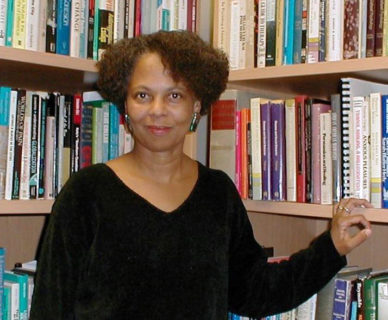Article begins

Image description: A Black woman with short brown hair stands in front of bookcases full of books in various sizes and colors. She wears a black long-sleeved shirt and rests one hand on a shelf.
Caption: Leith Mullings
1945–2020
We mourn the loss of Leith Mullings, a Black feminist, cultural anthropologist, and public intellectual. She leaves behind a profound impact on the field of anthropology and beyond, as an engaged scholar, mentor, and leader. Her deep commitment to social justice, liberation, and the transformative power of everyday people’s resistance and resilience motivated her compelling scholarship.
Mullings intertwined scholarship, mentorship, and community activism. Out of her Centers for Disease Control and Prevention-funded Harlem Birthright Project, she developed the influential concept of the Sojourner Syndrome to capture the interlocking ways that race, class, gender, and resistance to oppression shape Black women’s bodies and biology. The enduring legacy of this work is also embodied in the students, many of them Black women, who worked with her on this project and whom she mentored into the field of anthropology. Her later work on the New York City African Burial Ground similarly reflects her commitment in mentoring young scholars and using scholarly research to uplift the efforts of people of African descent to construct, protect, and preserve their own history.
Much of her foundational research on urban anthropology, health disparities, social movements, and Black people’s struggles for freedom focused on the United States. But she was committed to a comparative, global approach. Her first book, Therapy, Ideology and Social Change: Mental Health and Healing in Urban Ghana, came out of her fieldwork as a doctoral student at the University of Chicago. Her most recent fieldwork examined the Black Lives Matter movement as part of a collaborative hemispheric anti-racist observatory project analyzing the conditions of Indigenous and African-descended peoples in the western hemisphere. In 2015, the Andrew Carnegie Foundation named her as a fellow for conducting this research.
As president of the American Anthropological Association from 2011–2013, Mullings put her stamp on the field through her skillful leadership. Her 2013 Presidential Address, “Anthropology Matters,” laid out a vision of the field aimed at rehabilitating its often overlooked contributions by scholars of color, feminists, and radical thinkers, imagining how anthropology could be.
Just as important was her lifelong participation in movements for social justice. She travelled to Jericho, Palestine, in 2017, to participate in founding a society of Palestinian anthropologists, Insaniyyat, on whose international advisory board she served. Only months before her passing, in the midst of the summer 2020 uprisings against US state violence against Black bodies, Mullings nurtured connections between Black and Palestinian anthropologists to explore the global workings of “Blackness.”
Mullings retired as a distinguished professor of anthropology from City University of New York’s (CUNY) Graduate Center in 2016. In her nearly three decades at CUNY, she was a major force in shaping the department as a place that supported politically engaged scholarship. She was an incredibly supportive mentor to the generations of scholars who carry on her commitments to social justice both inside and outside of the academy.
Mullings was born in Mandeville, Jamaica, and came to the United States at the age of three, landing in New York City, where she continued to live much of her life. She studied nursing at CUNY’s Queens College, where she first encountered the field of anthropology in a class taught by Hortense Powdermaker. She passed away on December 13, 2020, at the age of 75. She was preceded in death by her husband Manning Marable and is survived by her children Alia Tyner and Michael Tyner; her granddaughter Lillieth Tyner; siblings Paul, Pauline, Pansy (the triplets), and Sandra Mullings; nephew Christopher Nova; nieces Candice Williams, Danielle Mullings, and Adriana Nova; and stepchildren Colby Tyner, Malaika Marable Serrano, Sojourner Marable Grimmett, and Joshua Marable.
(Maggie Dickinson and Khaled Furani)
Cite as: Dickinson, Maggie and Khaled Furani. 2021. “Leith Mullings.” Anthropology News website, February 1, 2021. DOI: 10.14506/AN.1581

